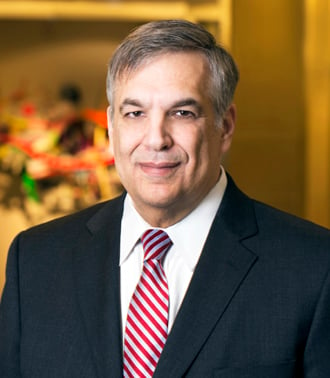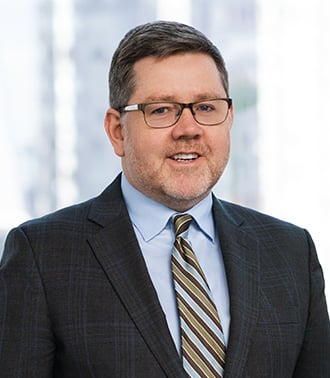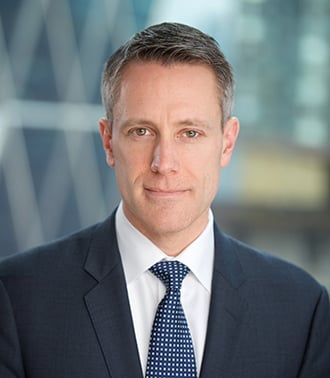The (Likely) New Banking Regulators in Their Own Words
The Trump administration has been busy on a number of fronts, including issuing a broad range of executive orders with potentially far-reaching effects on banking organizations. This Advisory focuses on the individuals that the Trump administration has either selected or that are prominently mentioned as candidates for leadership positions at the federal banking agencies — namely Michelle Bowman, Jonathan Gould, Travis Hill, and Rodney Hood. We describe their views on the issues that matter to the banking industry, and what they are likely to prioritize — using their own words.
Michelle Bowman
Michelle Bowman has served as a governor on the Board of Governors of the Federal Reserve System (Federal Reserve) since November 2018, and on March 17, 2025, was nominated by President Trump to replace Governor Michael Barr, who resigned from the position on February 28, 2025, as the Federal Reserve’s Vice Chair of Supervision. The Vice Chair oversees the Federal Reserve’s supervisory and regulatory agenda.
In public remarks, Governor Bowman frequently mentions her “deep roots in rural Kansas and a long history in farming, ranching, and ag banking.”1 Before serving on the Federal Reserve Board, she spent seven years working at her family’s bank, the Farmers & Drovers Bank, in Kansas, and then served as the state bank commissioner of Kansas from January 2017 to November 2018.2 As a result of her background and current role,3 she has historically focused on the effect of the Federal Reserve’s policies on community banks and rural communities.
Regulation
“I am optimistic about the future of banking in the United States and believe that the banking regulators can support the banking system by adopting a more pragmatic approach. While this is a non-exclusive list, I continue to believe the areas that we should focus on should include (1) prioritizing safety and soundness, (2) renewing our commitment to regulatory tailoring, and (3) increasing transparency.”4
Governor Bowman has repeatedly spoken about the importance of “a pragmatic approach to policymaking,” which requires regulators “to identify the problem [they] are trying to solve, determine whether [they] are the appropriate regulator to address the problem based on [their] statutory mandates and authorities, and explore options for addressing the identified issue.”5 She has also stressed the importance of setting clear regulatory priorities, “both for banks managing their businesses and for regulators deciding how to fulfill their responsibilities;”6 tailoring regulations to “the size, complexity, capacity, and risks posed by an institution;”7 and promptly responding to questions from regulated entities: “[b]anks should not be left to wonder whether an interpretation of existing laws, regulations, and guidance is consistent with the understanding of regulators.”8
Governor Bowman has also noted that many of the Federal Reserve’s regulations “that address core banking issues — from loans to insiders, to transactions with affiliates, to state member bank activities, and holding company requirements” have not been updated in decades and are overdue for both modernization and simplification, “including thresholds for applicability and benchmarks.”9
Basel Endgame
“Notwithstanding what has brought us to this point, I do see a path forward to implement Basel III, one that addresses not only the overall calibration as well as international consistency and comparability, but also makes more granular changes that will improve the effectiveness and efficiency of the rule. In October 2023, the Federal Reserve launched a data collection to gather information from the banks affected by the U.S. proposal. I am hopeful that this data will allow regulators to better understand the impact of the proposal and to identify areas for revision. Any next step in this rulemaking process will require broad and material changes. It should also be accompanied by a data-driven analysis of the proposal and informed by the significant public input received during the rulemaking process. This should assist policymakers in creating a path to improve the rulemaking. My hope is that policymakers pay closer attention to the balance of costs and benefits and consider the direct and indirect consequences of the capital reform.”10
Governor Bowman has been openly critical of the Federal Reserve’s Basel Endgame proposal and the process that led to it. She supports a U.S. implementation that would be consistent with international standards, and has criticized the proposal as calibrating capital standards far in excess of what is required in other jurisdictions. She supports addressing redundancy, making changes to the market risk rule, addressing disadvantages arising from fee income in operational risk calculations, considering the effect on the U.S. Treasury market, and exploring further tailoring of requirements.
New Charters
“Our goal should be to facilitate new bank creation — identifying and finding achievable pathways to yes, instead of expecting and insisting on increasing requirements to unachievable levels or those that are intended to deter applicants from filing or moving forward.”11
In recent speeches, Governor Bowman has expressed concern that the application process for de novo institutions is becoming a deterrent to would-be new applicants.12 She has also expressed concern that the lack of applications is leading to an erosion of “institutional muscle memory for how to deal with new bank charters.”13 Governor Bowman has suggested these issues could be ameliorated by “developing specialized expertise, streamlining the application process, and improving transparency.”14 According to Governor Bowman, “we should have clear standards of review and approval — and coordinated actions — among the state and federal regulators involved in any application. This should include clear timelines for the point at which a regulator forfeits their opportunity to object due to inaction, delay, or stalling tactics.”15
New Frontiers
“Our goal should not be to create a banking system that is safe, sound, and ultimately irrelevant.”16
Governor Bowman has long advocated that the Federal Reserve’s “approach to supervision be modernized so that it supports responsible innovation by our supervised institutions” consistent with safety and soundness.17 She also speaks often about appropriately managing risk instead of trying to eliminate it altogether.18
DEI
“In my view, central banks have a responsibility to be leaders in addressing diversity and inclusion, not only for our own institutions, but also because of our influence on the profession as a whole.”19
Prior to the start of the second Trump administration’s aggressive new approach to diversity, equity, and inclusion, Governor Bowman was known to discuss the importance of the Federal Reserve’s role in promoting diversity in the banking industry. It is unclear to what extent she would continue to call for diversity in the banking industry as the Vice Chair of Supervision.
Travis Hill
Travis Hill has served as the Acting Chairman of the Federal Deposit Insurance Corporation (FDIC) Board since January 20, 2025, and has served in various roles at the FDIC since 2018. Prior to his appointment as Acting Chairman, Hill served as the Vice Chairman of the FDIC’s Board since January 2023, having been a Republican appointee of the Biden administration. Before then, Hill worked at the FDIC as Deputy to the Chairman for Policy and, before that, as Senior Advisor to the Chairman, overseeing and coordinating regulatory and policy initiatives at the agency and advising the Chairman on regulatory and policy matters. Hill served on the staff of the Senate Banking Committee prior to his service at the FDIC.
Acting Chairman Hill is reportedly seen as one of the top contenders for the permanent position as Chairman of the FDIC, although the Trump administration has not yet addressed who the permanent Chair might be. There have also been news reports that the Trump administration is considering consolidating the FDIC with the Office of the Comptroller of the Currency (OCC).
Supervision
“As we consider ways to ensure timely remediation of supervisory issues, supervisors also need to consider ways to (1) complete exams and communicate findings in a more timely way and (2) better prioritize core safety and soundness risks…. We should [supervise] with humility, and remember that examiners do not and should not manage banks or determine business strategies, and that bank supervision cannot and should not prevent all bank failures.”20
Acting Chairman Hill has repeatedly emphasized his intent to have the FDIC’s bank supervisors prioritize core financial and banking risks and de-emphasize process violations that have less impact on the safety and soundness of a bank. To that end, Acting Chairman Hill has repeatedly referenced the supervisory failures related to the March 2023 regional banking crisis, where examiners had identified a number of procedural issues but had failed to sufficiently address the banks’ critical weaknesses related to interest rate risk.
Acting Chairman Hill has indicated an interest in enhancing the timeliness of the FDIC’s examinations and the issuance of reports of examination. Acting Chairman Hill has also expressed a general interest in more carefully defining the scope of the FDIC’s bank supervision to avoid “coloring outside the lines” of the FDIC’s statutory mandates and “managing” banks via supervision.
Regulation
“I expect the FDIC [will] … [c]onduct a wholesale review of regulations, guidance, and manuals to ensure our rules and approach promote a vibrant, growing economy … [m]odernize implementation of the Bank Secrecy Act … [r]eevaluate our disclosure practices, and expand transparency in areas that do not impact safety and soundness or financial stability … [and] [w]ithdraw problematic proposals from the past three years, such as proposals on brokered deposits and corporate governance.”21
Acting Chairman Hill has gestured at his desire for a broad deregulatory agenda at the FDIC, suggesting that the FDIC would engage in a wholesale review of existing regulations and guidance in order to better promote economic growth. Acting Chairman Hill indicated particular concern with the FDIC’s proposed rule revising its existing brokered deposits regulations.22 Acting Chairman Hill has expressed a desire for Congress to revisit the underlying statutory framework before the FDIC engages in a rulemaking to revise its existing regulations affecting brokered deposits. In fact, the FDIC has already acted to withdraw formerly proposed rules related to brokered deposits and corporate governance.
Acquisitions and New Charters
“I expect the FDIC [will] … [i]mprove the bank merger approval process and replace the 2024 Statement of Policy to ensure that merger transactions that satisfy the Bank Merger Act are approved in a timely way … [and] [e]ncourage more de novo activity so there is a healthy pipeline of new entrants in the banking sector.”23
Acting Chairman Hill indicated a general openness and support for increased M&A activity in the banking sector — namely, through improved timeliness for approvals. The FDIC already rescinded the agency’s Biden-era 2024 Statement of Policy on Bank Merger Transactions, which had put an end to expedited processing of bank merger applications. Acting Chairman Hill has also indicated increased support for de novo banking activities, but has not provided specifics.
New Activities and Debanking
“I also expect the FDIC to take a more open-minded approach to innovation and technology adoption, while still promoting core safety and soundness principles. There is a healthy balance between (1) allowing banks to evolve with the times and (2) ensuring banks continue to manage risks prudently, and in recent years the FDIC has done a poor job striking that balance…. Over the past few years, there have been various accounts of individuals and businesses associated with the crypto industry losing access to bank accounts without explanation…. Efforts to debank law-abiding customers are unacceptable, regulators must work to end it, and there is no place at the FDIC for anyone who has pushed — explicitly or implicitly — banks to stop serving law-abiding customers.”24
Acting Chairman Hill has demonstrated far more openness to novel financial technologies, including digital assets and tokenization,25 than was typical of financial regulators during the Biden administration, and Acting Chairman Hill has been critical of the so-called “debanking” of digital-asset clients. His perspective appears to mirror that of the Trump administration on these issues, and his statements align with those of President Trump’s Executive Order on Strengthening American Leadership in Digital Financial Technology.
Acting Chairman Hill’s statements signal fair trade winds for the digital assets industry and fintech companies, as well as banks that are looking to partner with these industries, to provide novel products and services to consumers.
Enhanced Capital and Liquidity Requirements
“I expect the FDIC [will] [p]ursue adjustments to our capital and liquidity rules to appropriately balance driving economic growth with ensuring safety and soundness and resilience to shocks.”26
Acting Chairman Hill has been sharply critical of the jointly proposed U.S. capital rules implementing the international banking standards, known as Basel-III “endgame.” He has echoed calls for “broad and material changes” and has urged the other banking agencies to draft a full re-proposal in 2025.27 He has indicated that this re-proposal must, among other changes, fully undo the proposed reversal of tailoring of the capital framework for large banks. Acting Chairman Hill has also stated that the agencies should not reverse the 2019 capital simplifications rule, and that Category IV banks should not be subject to the new market risk framework (unless they have material trading activities), the Standardized Approach for Counterparty Credit Risk, or the proposed expanded risk-based approach.
Acting Chairman Hill has also advised against knee-jerk revisions to liquidity requirements for banks in the aftermath of the spring 2023 banking crisis and instead encouraged regulators to do a wholesale reexamination of these liquidity rules to identify potential reforms.28
Tailoring of Prudential Standards
“[U]ndoing the tailoring of our rules would be a mistake. We benefit from having a financial system with banks of many different sizes and business models. As institutions shrink in size and complexity, the relative benefits of more burdensome rules diminish ... while the relative costs of complying with rules increase…. Eliminating rules and standards that differentiate among types of firms will ultimately lead to a reduction in differentiation among firms themselves, incentivizing further consolidation and homogeneity in its place.”29
Acting Chairman Hill has pushed back sharply on a one-size-fits-all regulatory approach to large banks, and has maintained that the imposition of especially complex and costly rules should be coextensive with the systemic importance of the bank itself.
Workplace Culture
“I expect the FDIC [will] [r]eestablish a strong workforce culture, where misconduct is not tolerated and those who engage in misconduct are held accountable.”30
Since late 2023, the FDIC has been reckoning with revelations of a toxic workplace culture marked by sexual harassment, discrimination, and other misconduct. Acting Chairman Hill has indicated an ongoing commitment to reforming the FDIC’s culture and preventing and punishing misconduct.
Jonathan Gould
On February 11, 2025, Jonathan Gould, a financial regulatory attorney in private practice, was nominated by President Trump to lead the OCC. Gould was previously Senior Deputy Comptroller and Chief Counsel at the OCC from 2018 to 2021 and Chief Counsel for the Senate Banking Committee from 2005 to 2008 and in 2018. During his tenure at the OCC, Gould led the OCC’s legal and licensing team through a period of active regulatory revision.
Prior to his time in government, Gould was a director at BlackRock from 2014 to 2018. Gould is the former Chief Legal Officer of blockchain infrastructure firm Bitfury and is currently a partner at a law firm in Washington, D.C. Considering his experience with the crypto industry, Gould is considered one of the crypto-friendly leaders President Trump has chosen to create a government that is more open to digital assets.
Because Gould has been in private practice since 2021, he has made fewer publicly reported speeches than the other nominees, and even fewer expressing his views on priorities for the OCC.
Digital Assets
“Anecdotal evidence suggests that agency actions ..., while responsive to developments in the digital asset ecosystem, are indeed having a chilling effect on banks' practical ability to engage in digital asset activities, as well as their willingness to entertain or maintain digital asset entities as banking customers. Because of the confidential nature of the supervisory relationship, it is impossible for the public to assess the actual causal effect of these agency actions.”31
On March 9, 2023, Gould testified in front of the House Financial Services Subcommittee on Diversity and Inclusion regarding Biden-era banking agency guidance “with respect to the digital asset ecosystem.” Gould noted that prior banking agency guidance may have “the understandable impact of making banks even more hesitant to bank crypto entities or crypto customers … further concentrating the risk in the very few remaining banks that will bank them.”32 He also identified three aspects of digital asset regulation that would benefit from congressional attention, including whether “the agencies’ actions might be disproportionate — whether in nature or magnitude — to the risks posed by digital assets;” whether “the agencies’ actions might be overbroad and risk chilling innovative activities;” and the appropriate “risk tolerance of our banking system, especially when it involves industry-specific attention as seems to be the case here.”33
Finally, he defended banks’ ability to manage the risks of taking custody of digital assets, noting that “banks historically have custodied all manner of assets whether they be electronically stored assets or physical assets. So, banks have a long history of managing the risks associated with the custodying assets.”34
Supervisory Process
“Although our current predicament differs from 2008, trust and confidence in the banking system is ebbing now. Competent bank supervision is a prerequisite to restoring that trust and confidence. Transparency into the supervisory strategies and priorities of the Fed and FDIC, particularly as they were applied to these failed banks, is a critical first step in understanding what went wrong. Given past failures at self-reform, Congress can and should exercise its full oversight authorities to ensure a different outcome this time.”35
On May 10, 2023, Gould testified in front of the House Financial Services Subcommittee on Financial Institutions and Monetary Policy regarding bank failures in March 2023. With respect to Federal Reserve supervision, Gould stated that “(1) the Federal Reserve did not enforce regulations that did apply to [Silicon Valley Bank] SVB; (2) the proliferation of regulations since the 2008 crisis may have reduced risk management and supervision to mere compliance exercises, damaging both in the process; and (3) over-reliance on preferred regulatory tools, such as the Fed’s regulatory capital stress testing program known as CCAR, may have blinded supervisors to risks that do not appear when viewed through that particular lens.”36 Notably, Gould criticized the Federal Reserve’s governance, structure, and conflicts of interest, noting that “its supervision failed to identify, much less address, some of the most basic safety and soundness risks applicable to a bank, including liquidity and interest rate risks.”37
Regarding the governance and structure of the Federal Reserve, Gould urged Congress to “consider whether and to what extent the Fed’s structure and governance is a contributing factor,” noting that “[t]he sheer complexity of the Fed’s supervisory processes is difficult to fathom and frustrates accountability.”38 In addition, Gould pointed out some potential conflicts of interest:
“An even greater concern is the inherent conflict of interest between the Fed’s monetary policy and bank supervision functions. The Fed’s rapid interest rate hikes are a source of systemic risk to the banks it supervises and were a cause of SVB’s failure.”39
Stress Testing
“The Fed's continuing failure to seek public comment on its stress models and scenarios, and in the case of the former, even disclose them at all[,] raises significant concerns under basic principles of administrative law.”40
In discussing stress testing before the House Financial Services Subcommittee on Financial Institutions and Monetary Policy in June 2024, Gould criticized current stress testing practices for its lack of accountability and transparency, particularly because “under the Fed's hybrid framework, supervisory stress testing is also used to limit capital distributions and has now become the means for setting binding capital requirements for large banks through the introduction of the stress capital buffer.”41 Gould added that “agency over-emphasis on regulatory capital as the primary supervisory tool risks marginalizing the important role of examination in ensuring the safety and soundness of banks.”42
Capital Requirements
“The agencies’ latest adventure in regulatory capital has been an unforced error. It has consumed vast agency resources and leadership attention that should have been spent elsewhere. Hardly an 'endgame,' a more realistic moniker might be the Basel III Infinity War.”43
In discussing the Basel III endgame before the House Financial Services Subcommittee on Financial Institutions and Monetary Policy in September 2024, Gould was critical of the Basel III endgame proposal, noting its “lack of factual support, absence of rigorous or informed cost benefit analysis, failure to disclose underlying data and assumptions, disregard for statutory tailoring requirements, and material deviations from the capital neutral intent of the Basel Committee on Banking Supervision’s (BCBS) international framework.”44 Gould urged Congress to provide the agencies with more explicit direction on the Basel III endgame:
“The agencies’ decision to propose another round of regulatory capital revisions in 2023 is not the result of a direct Congressional mandate, nor is this rulemaking an exercise in which the agencies are merely applying their technical expertise to implement a preexisting policy mandate. On the contrary, the agencies are engaged in weighing and making trade offs that balance system risk tolerance with economic growth. When agencies undertake major regulatory initiatives absent a Congressional mandate, their reform lacks credibility and may be vulnerable to legal challenge.”45
Rodney Hood
On February 7, 2025, U.S. Secretary of the Treasury Scott Bessent designated Rodney E. Hood to serve as Acting Comptroller of the Currency, effective February 10, 2025.46 Prior to his designation, Acting Comptroller Hood served as a board member of the National Credit Union Administration (NCUA) from 2005 to 2009 and as Chairman of the NCUA from 2019 to 2021, though he remained on the NCUA board until 2024. Over his career, he has also held roles at national banks, including JP Morgan Chase, Wells Fargo, and NationsBank (now Bank of America). In the year prior to being designated Acting Comptroller, Acting Comptroller Hood was appointed to the boards of several fintechs, including Zest AI, Posh AI, ModernFi, and DefenseStorm. While Chairman of the NCUA, Hood served as a voting member of the Financial Stability Oversight Council and Vice Chairman of the Federal Financial Institutions Examination Council.
In his first public appearance following his designation, Acting Comptroller Hood shared his priorities for the OCC at the American Bankers Association Conference for Community Bankers.47 At the onset of his remarks, Hood reiterated that, notwithstanding his designation, “acting does not mean inactive.” Rather, Acting Comptroller Hood committed “to be working daily and diligently to reduce [the] regulatory burden” of community banks and “strengthen the community banking system” as the “bedrock of the economy.” Moreover, Hood emphasized that “it is time” for community bankers “to receive all the support that they need to thrive.”48 While Hood’s remarks were specific to community banks, they provide clues about Hood’s approach to bank supervision and regulation for however long he remains Acting Comptroller.
Mergers and Acquisitions
“[L]ooking at [bank] merger applications and the packages, [one] cannot get the accurate score of [a bank’s] market share because [of] the credit unions.”49
Acting Comptroller Hood expressed concern over the accuracy of market share data submitted with bank merger applications. According to Hood, “credit unions[’] … market share is not included in the [merger application] report” considered by regulators. In response, Hood committed to working with the U.S. Department of Justice Antitrust Division to “appropriately and accurately” reflect market share scores, such as through a memorandum of understanding.
Bank-Fintech Partnerships
“[Bank-Fintech] partnerships are critically important for [community banks] to serve your clients and your customers.”50
Acting Comptroller Hood committed to providing additional “regulatory clarity and guidance,” as well as any other “materials that [community banks] need.” Hood encouraged community banks “to embrace technological partnerships” and committed the OCC to “strengthen[ing] [its own] technology shop” through the use of regulatory technology (RegTech). Through such RegTech, Hood suggested that the OCC would increasingly turn to the use of tech sprints and regulatory sandboxes. Notwithstanding his support of bank-fintech partnerships, Hood advised community banks to bring “examiners into the [onboarding] process early” and consider the “opinion pieces [published by the OCC] regarding third-party risk management.”
Financial Inclusion
“[F]inancial inclusion is undeniably the civil rights issue of our time.”51
Pointing to his previous experiences in Africa as a missionary, Acting Comptroller Hood committed to “fight tirelessly and diligently to promote financial inclusion” and suggested that his desire to “help[] the least amongst us” derives from an “ecclesiastical interest” that “plays out in [his] daily life as a regulator.” More specifically, Hood expressed concern over “individuals who are not involved in the mainstream economy” and thereby “vulnerable to pernicious and predatory payday lenders,” as well as the “credit invisible.” Hood encouraged community banks to extend financial inclusion activities beyond checking and savings accounts to wealth management, retirement planning, and other investment opportunities so that customers may “begin their lifelong economic journey.”
Technology and Cybersecurity
“[T]echnology is [going] to be critically important for [community banks] to serve your clients and to deepen your relationships using that technology.”52
Acting Comptroller Hood suggested that technology should be used to “enhance operational efficiency.” As a further area of focus, Acting Comptroller Hood advised community banks to “tailor [their] cybersecurity approach to the size and complexity of [the] institution.” Suggesting that community banks “batt[en] down [their] defense mechanisms,” such as “multifactor authentication” and “operational risk management,” Hood warned of “bad actors” who “wish to do us harm.” To assist community banks, Hood committed to provide “regulatory clarity and guidance” for community banks to “have a strong cybersecurity framework,” including tabletop exercises, tech sprints, and training sessions.
BSA/AML
“BSA and AML [are] also important as we look at the greater use of digital assets and cryptocurrencies.”53
Acting Comptroller Hood further identified the Bank Secrecy Act (BSA) and anti-money laundering (AML) efforts as “critically important,” particularly with “greater use of digital assets and cryptocurrencies.” Notwithstanding an effort to “strengthen [the OCC’s] BSA and AML protocols,” Hood committed to do so without such protocols “being deleterious to [community banks’] bottom line.” For example, Hood suggested raising the reporting threshold for Currency Transaction Reports, such as by “indexing it to inflation.”
Tailored Regulation
“[Current regulations are] not properly tailored…. [W]e need to have all of our activities predicated on [the] size and complexity of institutions.”54
Suggesting that current regulations embrace a “one size fits all approach,” Acting Comptroller Hood committed to “a principles-based approach” to regulation. To do so, Hood stated that the OCC would review existing rules “to make sure [the agency is] looking at appropriate opportunities to reduce regulatory burden.”
* * *
If you would like more information about how potential new leadership of the federal banking agencies may impact your business, please contact any of the authors of this Advisory or your usual Arnold & Porter contact. The firm’s Financial Services team would be pleased to assist with any questions that you may have.
© Arnold & Porter Kaye Scholer LLP 2025 All Rights Reserved. This Advisory is intended to be a general summary of the law and does not constitute legal advice. You should consult with counsel to determine applicable legal requirements in a specific fact situation.
-
Michelle W. Bowman, Welcoming Remarks to the National Agricultural Credit Conference (Mar. 25, 2019).
-
Michelle W. Bowman, Federal Reserve History.
-
Governor Bowman is the first governor to fill the role on the Federal Reserve Board specifically designated for someone with community banking experience.
-
Michelle W. Bowman, Reflections on 2024: Monetary Policy, Economic Performance, and Lessons for Banking Regulation (Jan. 9, 2025).
-
Michelle W. Bowman, Bank Regulations in 2025 and Beyond (Feb. 5, 2025).
-
-
Michelle W. Bowman, Statement before the Committee on Banking, Housing, and Urban Affairs, U.S. Senate (June 5, 2019).
-
Michelle W. Bowman, Brief Remarks on the Economy and Accountability in Supervision, Applications, and Regulation (Feb.17, 2025).
-
-
Michelle W. Bowman, Perspectives on U.S. Monetary Policy and Bank Capital Reform (June 25, 2024).
-
Michelle W. Bowman, Brief Remarks on the Economy and Accountability in Supervision, Applications, and Regulation (Feb. 17, 2025).
-
-
-
-
-
-
Michelle W. Bowman, Community Banking in the Age of Innovation: Remarks at the “Fed Family” Luncheon at the Federal Reserve Bank of San Francisco (Apr. 11, 2019).
-
See, e.g., Michelle W. Bowman, Brief Remarks on the Economy and Accountability in Supervision, Applications, and Regulation (Feb 17, 2025).
-
Michelle W. Bowman, Closing Remarks at “Gender and Career Progression” European Central Bank (Oct. 21, 2019).
-
Travis Hill, Insights on the FDIC's Agenda (Sep. 21, 2023).
-
Travis Hill, Statement From Acting Chairman Travis Hill (Jan. 21, 2025).
-
Travis Hill, Reflections on Bank Regulatory and Resolution Issues (July 24, 2024).
-
Travis Hill, Statement From Acting Chairman Travis Hill (Jan. 21, 2025).
-
Travis Hill, Charting a New Course: Preliminary Thoughts on FDIC Policy Issues (Jan 10, 2025).
-
See, e.g., Travis Hill, Banking’s Next Chapter? Remarks on Tokenzation and Other Issues (Mar. 11, 2024).
-
Travis Hill, Statement From Acting Chairman Travis Hill (Jan. 21, 2025).
-
Travis Hill, Remarks at the American Enterprise Institute: “Reflections on Bank Regulatory and Resolution Issues” (July 24, 2024).
-
Travis Hill, Insights on the FDIC’s Agenda (Sep. 21, 2023).
-
-
Travis Hill, Statement From Acting Chairman Travis Hill (Jan. 21, 2025).
-
Testimony of Jonathan V. Gould, U.S. House Financial Services Subcommittee on Diversity and Inclusion, Hearing on Coincidence or Coordinated? The Administration’s Attack on the Digital Asset Ecosystem (Mar. 9, 2023).
-
House Financial Services Subcommittee on Financial Institutions and Monetary Policy Holds, Hearing on Stress Testing (June 26, 2024).
-
Testimony of Jonathan V. Gould, U.S. House Financial Services Subcommittee on Diversity and Inclusion, Hearing on Coincidence or Coordinated? The Administration’s Attack on the Digital Asset Ecosystem (Mar. 9, 2023).
-
House Financial Services Subcommittee on Financial Institutions and Monetary Policy Holds, Hearing on Stress Testing (June 26, 2024).
-
Testimony of Jonathan V. Gould, U.S. House Financial Services Subcommittee on Financial Institutions and Monetary Policy Holds, Hearing on Federal Responses to Recent Bank Failures (May 10, 2023).
-
-
-
-
-
Testimony of Jonathan V. Gould, U.S. House Financial Services Subcommittee on Financial Institutions and Monetary Policy Holds, Hearing on Stress Testing: What’s Inside the Black Box? (June 26, 2024).
-
-
-
Testimony of Jonathan V. Gould, U.S. House Financial Services Subcommittee on Financial Institutions and Monetary Policy, Hearing on Regulatory Recipe for Economic Uncertainty: The Endless Basel Endgame and an Onslaught of Hurried Rulemaking Undertaken by the Biden-Harris Administration (Sept. 25, 2024).
-
-
-
Press Release, Off. of the Comptroller of the Currency, Rodney E. Hood Announced as Acting Comptroller of the Currency (Feb. 7, 2025).
-
Rodney E. Hood, Acting Comptroller of the Currency, Conversation at the American Bankers Association Conference for Community Bankers (Feb. 18, 2025).
-
-
-
-
-
-
-














